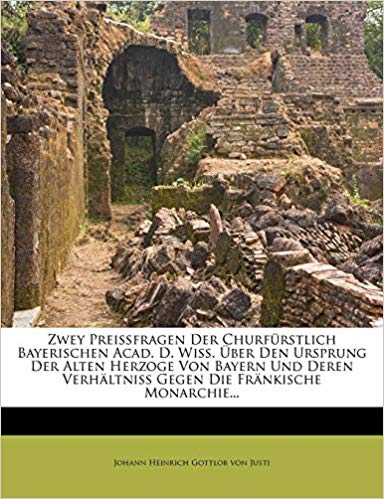Background
Johann Heinrich Gottlob Justi was born on December 28, 1717, in Brücken, Thuringia, Germany. The son of a tax assessor, he spent his earliest years in modest circumstances.

1762
In 1762 Justi was elected an honorary member of the Bavarian Academy of Sciences.
University of Wittenberg, Halle, Saxony-Anhalt, Germany
Justi's career can be followed with some certainty from the commencement of his legal studies at the University of Wittenberg.

https://www.amazon.com/Prei%C3%9Ffragen-Churf%C3%BCrstlich-Bayerischen-Verh%C3%A4ltni%C3%9F-Fr%C3%A4nkische/dp/1279921846/?tag=2022091-20
1763
economist educator jurist author
Johann Heinrich Gottlob Justi was born on December 28, 1717, in Brücken, Thuringia, Germany. The son of a tax assessor, he spent his earliest years in modest circumstances.
Justi's career can be followed with some certainty from the commencement of his legal studies at the University of Wittenberg. He interrupted these studies after a short time to enter the Prussian military service, and he participated in the first Silesian War in 1741-1742. At the end of the war, he continued his education in Jena and Leipzig.
Following the conclusion of his studies in 1747 Justi took the post of estates manager for the duchess of Sachsen-Eisenach at Sangerhausen.
In 1751 Justi accepted a professorship of cameralistics at the newly established Theresian Academy (Theresianum) in Vienna, where he gave lectures on financial and fiscal science and where he also occupied the chair of German eloquence and rhetoric. Along with this teaching activity, he was entrusted in Vienna with administrative tasks because of his extensive knowledge of government and finance, and he was appointed imperial counselor of finances and mines. Justi’s good fortune did not last, however; as a result of failures in mining ventures, he lost the respect and trust of his superiors and in 1754 resigned from the Austrian civil service. From that time on he wrote his name as von Justi, asserting that Emperor Francis I had ennobled him.
Thereafter Justi led an unsettled life which took him to Leipzig, Erfurt, and Gottingen. He did not remain long in Gottingen, even though in 1755 he was given the position of mining counselor and chief of police there, with the prerogative of delivering lectures at the university. In 1757 he again left the electorate of Brunswick, brought his family to Altona, and went himself to Copenhagen, where he obtained a commission from Count Bernstorfif to inspect the Jutland heath region and to submit proposals for its cultivation.
After completing this assignment and rejecting a highly paid position as Norwegian superintendent of mines, Justi left Denmark in 1758 for Berlin on the advice of the Prussian state official Hecht - in order to seek employment in the state administration. The government held out hope of an appointment as soon as the Seven Years’ War ended. In the subsequent period of involuntary leisure (1758-1766), Justi displayed an uncommonly varied literary activity.
By 1766 Frederick the Great, honoring his promise of an appointment, made Justi superintendent of mines and inspector general of the state mines as well as of glass and steelworks in Prussia. He later became completely blind; a growing sense of grief and distrust at his fate led him to be headstrong and injudicious in certain actions and brought him into discredit for supposedly squandering state funds. In 1768 he was dismissed from his position on this charge, although it had not been proved. In order to exonerate himself and win his reinstatement, Justi called for an investigatory commission and voluntarily entered state custody at Küstrin. He died there of a stroke on July 21, 1771, before the end of the trial.
Johann Heinrich Gottlob Justi’s scientific importance undoubtedly lies - as his numerous publications show - in the field of political science. Blessed with a rich knowledge of the real conditions of public life and public administration, he independently brought a new direction to this field. He can be called the first German systematist of the political sciences, including police science, financial science, and industrial organization.
In 1747 he received a prize from the Prussian Academy of Sciences for his work on monads. He also worked on two prize questions posed by the Bavarian Academy of Sciences in Munich and won both prizes in 1761.
Justi originally based his political economics on mercantilism. Later the influence on him of Montesquieu and the Encyclopedists became noticeable, and Justi came to represent more the newly founded physiocratic doctrines than the previously reigning mercantilist viewpoint.
In recognition of Justi's extraordinary and important achievements, he was offered the position of president of the Bavarian Academy of Sciences. Justi refused, on personal grounds, whereupon in 1762 the Academy elected him an honorary member.
Justi was respected for his extraordinary abilities and diligence, which were evident in both his scientific and his literary work. He wrote as effortlessly as he grasped things mentally. Although his style lacks polish, it has something original and naïve, and Justi’s friends compared him in character and style to Buffon.
Physical Characteristics: Excessive writing had weakened Justi’s eyes, and he could only do his work with the help of an assistant appointed by the king. Later Justi became completely blind.
Justi married twice and had several sons and daughters from each marriage.
